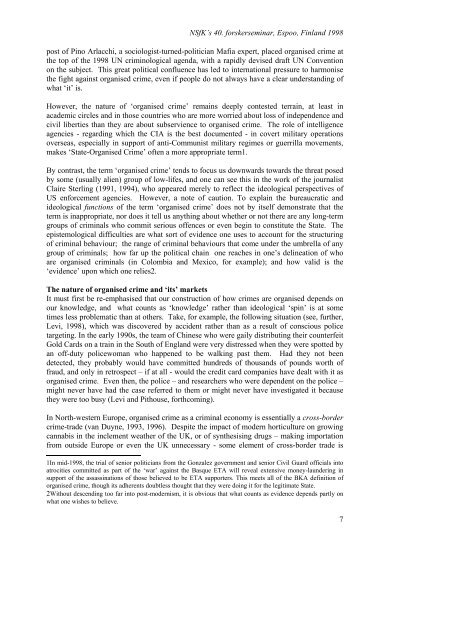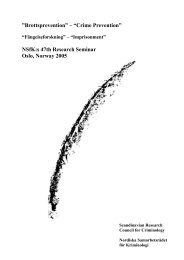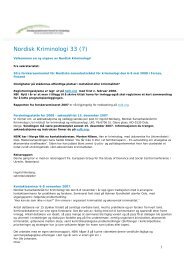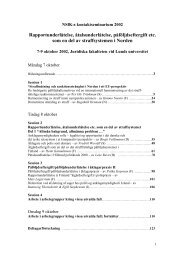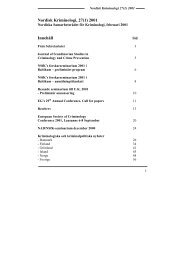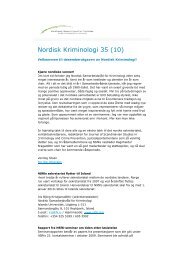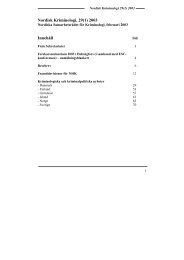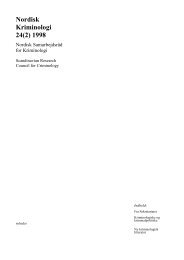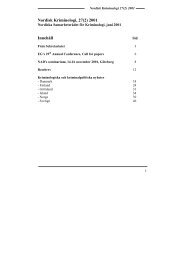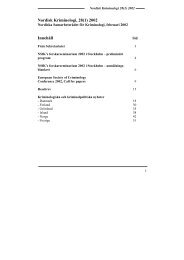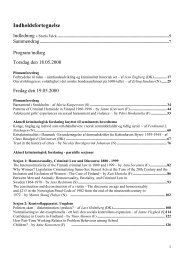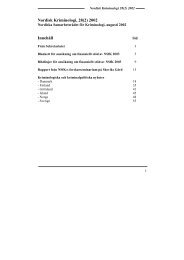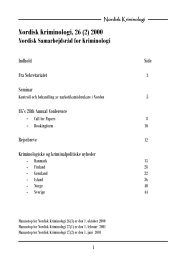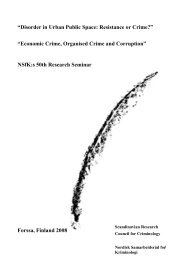Organised Crime & Crime Prevention - what works? - Scandinavian ...
Organised Crime & Crime Prevention - what works? - Scandinavian ...
Organised Crime & Crime Prevention - what works? - Scandinavian ...
Create successful ePaper yourself
Turn your PDF publications into a flip-book with our unique Google optimized e-Paper software.
NSfK’s 40. forskerseminar, Espoo, Finland 1998<br />
post of Pino Arlacchi, a sociologist-turned-politician Mafia expert, placed organised crime at<br />
the top of the 1998 UN criminological agenda, with a rapidly devised draft UN Convention<br />
on the subject. This great political confluence has led to international pressure to harmonise<br />
the fight against organised crime, even if people do not always have a clear understanding of<br />
<strong>what</strong> ‘it’ is.<br />
However, the nature of ‘organised crime’ remains deeply contested terrain, at least in<br />
academic circles and in those countries who are more worried about loss of independence and<br />
civil liberties than they are about subservience to organised crime. The role of intelligence<br />
agencies - regarding which the CIA is the best documented - in covert military operations<br />
overseas, especially in support of anti-Communist military regimes or guerrilla movements,<br />
makes ‘State-<strong>Organised</strong> <strong>Crime</strong>’ often a more appropriate term1.<br />
By contrast, the term ‘organised crime’ tends to focus us downwards towards the threat posed<br />
by some (usually alien) group of low-lifes, and one can see this in the work of the journalist<br />
Claire Sterling (1991, 1994), who appeared merely to reflect the ideological perspectives of<br />
US enforcement agencies. However, a note of caution. To explain the bureaucratic and<br />
ideological functions of the term ‘organised crime’ does not by itself demonstrate that the<br />
term is inappropriate, nor does it tell us anything about whether or not there are any long-term<br />
groups of criminals who commit serious offences or even begin to constitute the State. The<br />
epistemological difficulties are <strong>what</strong> sort of evidence one uses to account for the structuring<br />
of criminal behaviour; the range of criminal behaviours that come under the umbrella of any<br />
group of criminals; how far up the political chain one reaches in one’s delineation of who<br />
are organised criminals (in Colombia and Mexico, for example); and how valid is the<br />
‘evidence’ upon which one relies2.<br />
The nature of organised crime and ‘its’ markets<br />
It must first be re-emphasised that our construction of how crimes are organised depends on<br />
our knowledge, and <strong>what</strong> counts as ‘knowledge’ rather than ideological ‘spin’ is at some<br />
times less problematic than at others. Take, for example, the following situation (see, further,<br />
Levi, 1998), which was discovered by accident rather than as a result of conscious police<br />
targeting. In the early 1990s, the team of Chinese who were gaily distributing their counterfeit<br />
Gold Cards on a train in the South of England were very distressed when they were spotted by<br />
an off-duty policewoman who happened to be walking past them. Had they not been<br />
detected, they probably would have committed hundreds of thousands of pounds worth of<br />
fraud, and only in retrospect – if at all - would the credit card companies have dealt with it as<br />
organised crime. Even then, the police – and researchers who were dependent on the police –<br />
might never have had the case referred to them or might never have investigated it because<br />
they were too busy (Levi and Pithouse, forthcoming).<br />
In North-western Europe, organised crime as a criminal economy is essentially a cross-border<br />
crime-trade (van Duyne, 1993, 1996). Despite the impact of modern horticulture on growing<br />
cannabis in the inclement weather of the UK, or of synthesising drugs – making importation<br />
from outside Europe or even the UK unnecessary - some element of cross-border trade is<br />
1In mid-1998, the trial of senior politicians from the Gonzalez government and senior Civil Guard officials into<br />
atrocities committed as part of the ‘war’ against the Basque ETA will reveal extensive money-laundering in<br />
support of the assassinations of those believed to be ETA supporters. This meets all of the BKA definition of<br />
organised crime, though its adherents doubtless thought that they were doing it for the legitimate State.<br />
2Without descending too far into post-modernism, it is obvious that <strong>what</strong> counts as evidence depends partly on<br />
<strong>what</strong> one wishes to believe.<br />
7


